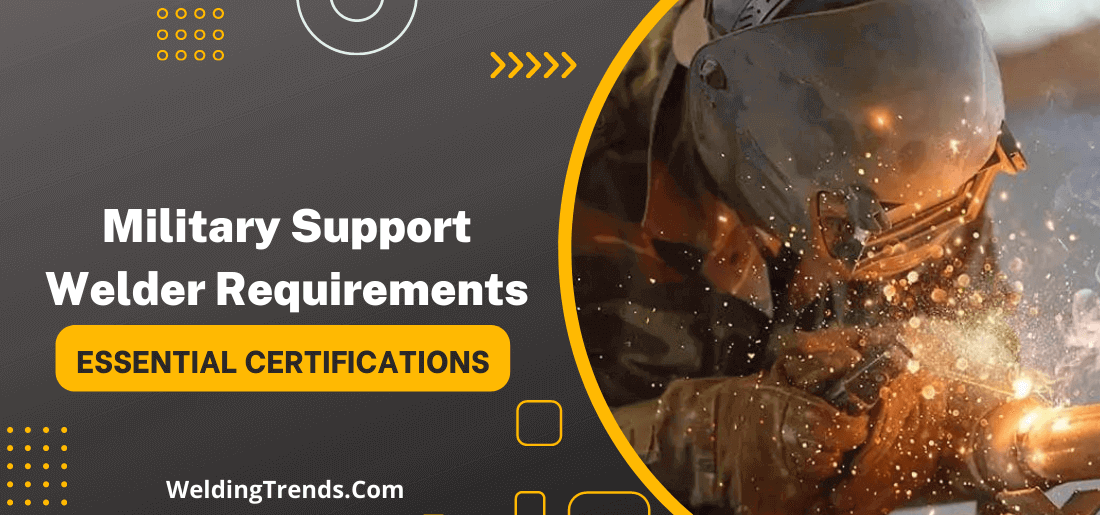Military support welders are in high demand due to the nature of their work. These welders need to have a variety of skills and be able to handle different types of welding jobs. Military support welders play an important role in helping keep troops safe while overseas.
But what are the requirements for someone to become a military support welder? And what kind of training is necessary?
In this blog post, we’ll answer those questions and more. So keep reading to find out everything you need to know about becoming a military support welder!
Military Support Welder Requirements
The following are the welder requirements for military support personnel:
- Able to pass a welding safety certification
- Able to pass a welding performance test
- Meet minimum physical requirements
- Be at least 18 years old
- Have a high school diploma or equivalent
- Have completed a welding apprenticeship or have equivalent experience
Training is necessary to become a military support welder
There are a few different ways that someone can become a military support welder.
- The most common way is to complete an apprenticeship. Apprenticeships usually last for two to four years and combine on-the-job training with classroom instruction.
- Another way to become a military support welder is to have equivalent experience. This means that the welder has worked in a welding capacity for at least two years.
- And finally, someone can become a military support welder by completing a welding program at a trade school or community college. These programs usually last for one to two years.
No matter which routes someone takes to become a military support welder, they will need to have a welding safety certification and pass a welding performance test.
What is the welding process used in military support applications?
Most welding that military support welders will be doing is MIG welding. This type of welding is used to join two pieces of metal together by using an electric arc.
The welder will use a wire that is fed through the gun and electrode to create the arc. The heat from the arc melts the wire and the metal, which fuses the two pieces of metal.
MIG welding is a great way to weld thick or thin pieces of metal together. It’s also fast and relatively easy to learn. That’s why it’s the most common type of welding used in the military.
Also, military support welders will need to be able to weld in difficult positions. This might include overhead welding or welding in tight spaces.
Being able to weld in difficult positions is a skill that takes time and practice to master. But it’s an important skill for military support welders to have because they never know what type of situation they might find themselves in while overseas.
How can welders become certified to work with military support equipment and materials?
Welders who want to become certified to work with military support equipment and materials can do so by completing a welding certification program.
After completing a welding certification program, welders will be able to show potential employers that they have the skills and knowledge necessary to safely and effectively work with these types of materials.
Employers may require welders to have certification from an accredited welding program to be considered for positions working with military support equipment and materials.
What are some of the challenges that welders face when working with military support applications?
One of the biggest challenges that welders face when working with military support applications is the fact that they are often working in difficult and dangerous conditions.
Welders working in the military might find themselves welding in combat zones or in other areas where there is a lot of fighting going on. This can be extremely dangerous and stressful.
Another challenge that welders face when working with military support applications is the fact that they might be required to work long hours. This can be especially true in combat zones where there is a lot of work to be done and not a lot of people to do it.
Welders who are working in these types of conditions need to be prepared for the possibility of working long hours and being in danger.
Are there any other benefits to becoming a certified welder for military support operations?
Welders who are certified through the American Welding Society (AWS) can help fill a critical shortage of skilled labor in the United States Military. In particular, AWS-certified welders can use their skills to support operations related to national defense.
In addition to supporting the military directly, certified welders can also help keep the American industry strong. Many of the goods and products that are essential to the military’s operations are manufactured in the United States.
By helping to ensure that these products are made to the highest standards, welders can help keep our country safe and secure.
Finally, certification can help welders advance their careers. Many employers prefer to hire certified welders and certification can open up opportunities for promotions and raises.
In addition, certified welders can take advantage of special programs and benefits, such as tuition assistance, that are not available to non-certified workers.
For all of these reasons, becoming a certified welder is a great way to support the military and our country while also advancing your career.
FAQs – Military support welders
What branch of the military is best for welding?
There is no one “best” branch of the military for welding. Each branch has its unique mission and each offers its opportunities for welders to use their skills in support of that mission.
Some welders may prefer to work in the Army, where they can use their skills to help build and repair
What does a welder do in the army?
In the army, a welder may use their skills to repair and maintain military equipment, build temporary structures or bunkers and support combat operations. They may also be called upon to assist with construction projects or disaster relief efforts.
Can a civilian be a military support welder?
Yes, civilians can work as military support welders. They may be employed directly by the military or by a civilian contractor who provides services to the military.
Civilians may also have the opportunity to use their welding skills in support of national defense through volunteer programs such as the Civil Air Patrol.
How much do military support welders make?
The salary for military support welders can vary depending on factors such as experience, location and employer. According to Indeed, the average salary for a military support welder is $53,000 per year.
Do military welders get deployed?
It is possible for military welders to be deployed, as they may be called upon to use their skills in combat or disaster relief operations. However, not all military welders will be deployed during their service.
Wrap Up
The military support welding requirements are important to ensure that the welders who are supporting our troops have the necessary skills and qualifications.
If you are looking for a welding career that offers stability and security, the military support welder may be a great option for you. With proper training and certification, this position can provide you with a good income and the opportunity to work on some amazing projects.
Have you considered becoming a military support welder?




